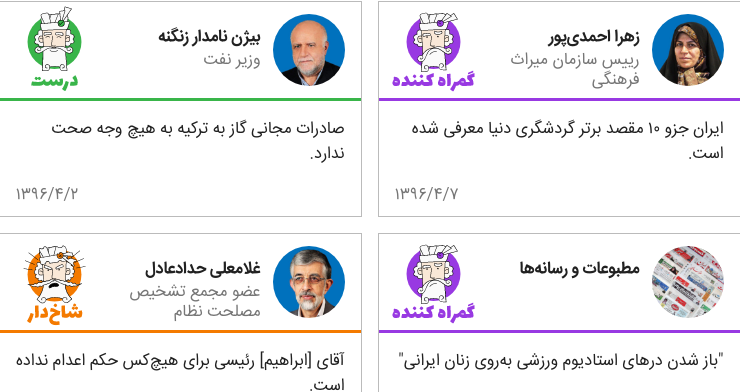Updated at 1:48 p.m. on August 14
From Argentina's Chequeado to Kenya's PesaCheck to Brazil's Aos Fatos, there are plenty of examples of fact-checking organizations across the globe which strive to hold public officials accountable. But tracking and verifying statements by officials can be particularly tricky in countries with high government censorship.
That's why two researchers from ASL19, a Canadian technology group aimed at helping bypass internet censorship, have created a fact-checking tool to monitor claims made by prominent Iranian politicians.
Fact Nameh picks significant statements made by high-ranking Iranian officials or politicians each week and ranks them on a “truth” meter. Ratings range from 100 percent accurate to half true (or misleading) to downright false. Each rating is accompanied by an article explaining how the statement’s truthfulness was assessed.
“It was really hard at the beginning,” says Farhad Souzanchi, the Toronto-based creator of Fact Nameh. “People didn’t know our intentions. They didn’t know if we were pro or anti-[Iranian President] Rouhani… but time showed that we are neither of those.”
“We stick to the facts,” he added. “Sometimes the pro-Rouhani people criticize us, other times the anti-Rouhani critics accuse us of helping him, based on certain verdicts we give. But in the long run, those who are following us closely know we’re not on either side.”
To add a humorous, visual element to their fact-checking, Fact Nameh accompanies their posts with an illustrated character who acts as an impartial "judge": Mirza.
Souzanchi describes him as a "wise older dude." When a statement is accurate, Mirza is shown looking immensely pleased. When a statement is misleading or cannot be confirmed, he looks confused or upset. Angry and scornful expressions are reserved for a Shaakh-daar ranking – the most ridiculous and absurd assertions that hold no truth.

Fact Nameh was launched on April 2 of this year — International Fact-Checking Day, just a month before the presidential elections in Iran. The initiative found a strong following on Twitter and Telegram almost immediately, Souzanchi said. “We focus on headlines or topics making the news... especially on claims that shouldn’t go unnoticed or unchecked,” he told IJNet.
The fact-checking tool seems to have caught the attention of Iranian politicians and media as well. In one recent case, after Zahra Ahmadipour, the head of Iran’s Cultural Heritage, Handcrafts and Tourism Organization, asserted that Iran was among the top 10 tourism destinations in the world, Fact Nameh ranked her statement as “misleading” for failing to provide evidence. After the team asked her via Twitter to provide her source for the tourism ranking, she responded and did so.
“When I personally thanked her on Twitter, she responded to that too, saying ‘that’s my duty,’” Souzanchi said.
Funded by the University of Toronto’s Munk Centre of Global Affairs, ASL19 has run similar fact-checking projects in the past, most notably Rouhani Meter, which tracks campaign promises by Iranian President Hassan Rouhani. Inspired by the success of Morsi Meter, the project has amassed some 32,000 followers on Facebook and Twitter.
While Fact Nameh’s audience in Iran is still growing, Souzanchi says he has observed some positive steps towards creating a culture of fact-checking inside the country. At one point, Iran’s state broadcaster, IRIB, hosted an in-studio discussion on the different ways political campaign promises are being monitored. Rouhani Meter was not mentioned — but the mere fact that fact-checking was being openly discussed was a positive step forward, Souzanchi notes.
“We would be happy if this trend and these activities make their way inside Iran,” he told IJNet. “It’s a great way to keep the politicians accountable, open and transparent.”
Images are screenshots from Fact Nameh.

